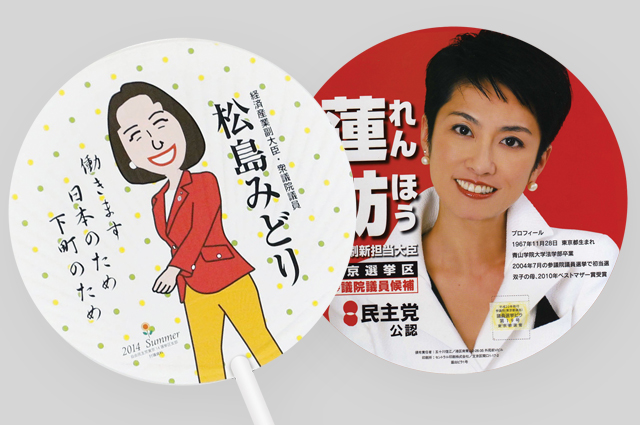You are a minister on the campaign trail trying to manufacture popularity for an upcoming election. You and your election team decide to take to the streets to distribute some promotional freebies. You print your name, face, a heartfelt slogan and a snapshot of your local policy platform onto a cheap sheet of round paper or cardboard. So far so good. Then, you notice it is 30 degrees Celsius outside, so you attach a handle onto the leaflet, make it into a fan, and hand them out to sweaty constituents at a summer festival. Ok, now you have gone too far. You are fired.
By Henry Watts
Midori Matsushima, now former Justice Minister, did exactly this with her leaflet (above, left) and was later forced to resign this month amid accusations of vote-buying. According to opposition DPJ lawmaker, Renho Murata, because Matsushima’s leaflet came with a handle and a fan-like frame, it was technically an ‘uchiwa’ (a paper fan). According to Renho, this qualifies as a “donation” of “an item of monetary value,” which is a violation of Article 139 of the Public Office Election Law. The Electoral Commission agreed with Renho.
Cue a flurry of fan-related political assaults across the parliamentary floor in both directions. Renho Murata, having led the attack against Matsushima, then faced questions herself regarding her own round paper leaflet (above, right), which she had distributed while campaigning for election to the House of Councillors in 2010. In response, she maintained that without a handle or frame, her leaflet does not fit the traditional definition of an uchiwa and is therefore perfectly legitimate. The Electoral Commission agreed with her, again, and her non-uchiwa leaflet got the green light.
When you work in an industry obsessed with scoring points and saving face in front of the voting public, the line between legal and illegal, job and no job, can become deceptively blurry.
So, what are we to make of all this triviality? For one, pushing legal loopholes is a very dangerous game. The prohibition against “donations” or distributing “items of monetary value” is a minefield of legal ambiguity that is as easy to get entangled in as it is to exploit. Take, for example, Article 139’s ban on serving any food or drink during an election campaign, “except tea and some sweets that are served only ordinarily.” This means in theory that serving an extra cookie with a mildly expensive brand of tea could make the difference between lawful hospitality and an illicit indulgence of corrupt intent.
Indeed, if one were to take a fastidious interpretation of a clause as vague as a prohibition on “items of monetary value,” then one could reasonably outlaw Renho’s leaflet too, for while it might not much resemble an effective uchiwa, it could certainly resemble a coaster/place mat, or mouse-pad, or dartboard, or makeshift pooper-scooper, or wobbly table stabilizer, or a myriad of other items.
But did she design the leaflet with such intent? Well, here marks the outer layer of the law—an area of almost unintelligible legal ambiguity (termed zaruhou in Japanese). It is the frontier, the penumbra, the grey area of regulatory loopholes where the letter of the law ends and the drama of interpretation begins. Here is the quarrelsome task of determining when an act of self-defense becomes murder; when a genuine campaign contribution becomes a bribe; when harmless hospitality becomes self-serving indulgence—or, if you are in Japan, when a leaflet becomes a fan.
Just days after Matshushima’s disgraced uchiwa was brandished in parliament, another fan-like leaflet came under investigation, this one belonging to LDP Deputy Defense Minister, Akira Satou. This leaflet—definitely an uchiwa—was approved without spectacle, however, because it had been placed at a reception desk, rather than actively distributed.
When you work in an industry obsessed with scoring points and saving face in front of the voting public, the line between legal and illegal, job and no job, can become deceptively blurry. And it turns politics into something of a fanfare—the kind of fanfare that convenes multiple times to debate nuances in the definition of a fan; that makes a politician as high up as Matsushima, Justice Minister, equivocate on what is clearly an uchiwa; that drives Matsushima’s uchiwa (costing a mere 80 yen a piece to make) to sell on Yahoo! auctions for 16,500 yen; and that can doubtless make anti-politics cynicism regrettably more fashionable.
You can follow Henry Watts at @HenryRomesh or his blog, letterstoyoungbarbarians.









